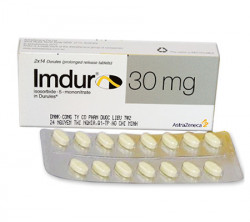Imdur (isosorbide mononitrate) Coupons, Discounts & Cost
Imdur (isosorbide mononitrate) is used to prevent or treat chest pain (angina). One way to save money on the Imdur (isosorbide mononitrate) retail cost regardless of income and insurance status is to use Imdur coupons or discount cards from RXCoupons. Use our Isosorbide Mononitrate coupons at your online pharmacy and receive up to 75% off the sale price each time you refill your prescription.
Imdur (isosorbide mononitrate) action and indications for use
Imdur (isosorbide mononitrate) is used to prevent or treat chest pain (angina). It works by relaxing the blood vessels (peripheral vasodilator). Isosorbide is a highly effective drug for the treatment of coronary heart disease and for the relief of angina attacks. This medication is sometimes prescribed to treat other disorders (ask your doctor or pharmacist for more information).
Isosorbide mononitrate is a preload-reducing agent (through the expansion of peripheral veins). It also helps reduce afterload (due to a decrease in total peripheral vascular resistance) and improve coronary blood flow. It improves exercise tolerance in patients with coronary heart disease (CHD), lowers blood pressure in the pulmonary circulation, and promotes regression of symptoms in pulmonary edema. Isosorbide mononitrate causes relaxation of the muscles of the bronchi, urinary tract, gallbladder, biliary tract and esophagus, as well as small and large intestines. The antianginal effect occurs after 30 minutes and lasts for 2-6 hours.
The active substance of the drug is completely absorbed after oral administration. Isosorbide mononitrate is excreted by the kidneys. The half-life is 4-5 hours. Liver and kidney disorders have no significant effect on the pharmacokinetics of the drug.
Imdur is prescribed for the relief and prevention of strokes, rehabilitation treatment after myocardial infarction, as well as for the treatment of some forms of pulmonary hypertension, chronic heart failure, pulmonary heart disease (as part of combination therapy). Isosorbide mononitrate is often used in combination therapy for the treatment of chronic heart failure.
When NOT to use Imdur (isosorbide mononitrate)?
Isosorbide is contraindicated in hypersensitivity to organic nitrates, increased intracranial pressure and low blood pressure, cerebral hemorrhage and traumatic brain injury, angle-closure glaucoma. Isosorbide is prescribed with caution in left ventricular failure, as well as during pregnancy and lactation. Isosorbide is also used with caution in severe renal impairment, hepatic insufficiency (risk of methemoglobinemia), hypothyroidism, diseases accompanied by increased intracranial pressure, in case of inadequate and poor nutrition. The drug is not used in children.
What is the best way to take Imdur (isosorbide mononitrate)?
Patients should consult a doctor before using this product.
Isosorbide tablets should be taken after meals with water. The frequency of administration and duration of treatment should be determined individually. The standard dose is 5-10 mg 3-4 times a day. When taken regularly, the dose may be increased to 30-60 mg once daily. After 3-6 weeks, it is recommended to make a break and take other similar drugs.
Isosorbide mononitrate in the complex therapy in ischemic heart disease and heart failure: take 20-40 mg once a day.
Abrupt discontinuation should be avoided (the dose should be reduced gradually). If you miss a single dose, do not take a double dose the next time.
Side effects of Imdur (isosorbide mononitrate)
When using isosorbide, patients may experience nausea, headache and dizziness. These side effects may disappear if you reduce the dose. Do not drink alcohol when using isosorbide. CNS: very often - headache; often - stiffness, drowsiness, blurred vision (especially at the beginning of treatment). Cardiovascular system: often - low blood pressure, orthostatic hypotension, tachycardia, confusion, dizziness, weakness. Uncommon reactions: paradoxical bradycardia, collapse, syncope, methemoglobinemia (long-term treatment). Gastrointestinal tract: nausea, vomiting, dryness of the oral mucosa. Skin and subcutaneous tissue disorders: allergic skin reactions (including rash), redness of the skin; very rare - edema, Stevens-Johnson syndrome, exfoliative dermatitis. Other disorders: sweating, myocardial hypoxia.

